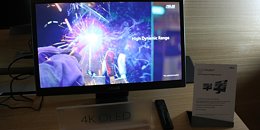Monday, December 24th 2018
JOLED Announces OLED Panels for PC Monitors, Expected to Hit the Market in 2019
JOLED, a Japanese Display, Sony and Panasonic group, has announced new OLED solutions for PC monitors that are expected to enter the market in 2019. While OLED has become ubiquitous in both high-end smartphones and TV's, some of the technology's quirks (read: burn-in) mean that it has some more problems that need addressing compared to the other, more traditional display panel technologies. That's likely one of the reasons OLEDs are taking so long to enter the PC monitor market, even though some of their characteristics (such as the fact that the announced JOLED models can features repsosne times of 0.1 ms) are naturally gamer-appealing.
The market entries will start small, with 21.6" diagonals in both 1080p (geared for gamers in partnership with Japanese e-sports team Burning Core) and 4K (which should make its way to the market inside ASUS' Proart PQ22UC. For some reason, there's apparently a 27" panel that's being developed specifically for smart home applications, instead of for the gaming crowds. Go figure.
Source:
PC Games Hardware.de
The market entries will start small, with 21.6" diagonals in both 1080p (geared for gamers in partnership with Japanese e-sports team Burning Core) and 4K (which should make its way to the market inside ASUS' Proart PQ22UC. For some reason, there's apparently a 27" panel that's being developed specifically for smart home applications, instead of for the gaming crowds. Go figure.

47 Comments on JOLED Announces OLED Panels for PC Monitors, Expected to Hit the Market in 2019
Regardless, until I see a credible study and re-test of OLED burn-in for static images, I'm not jumping. So far there is good reason not to put it in a monitor.
It absurd how many panel types there are out there.
I agree with oled concerns tho. Fanboys will deny it with the usual "I have an oled tv for 3 centuries and it never got burn in, so my situation means burn in is a myth".
But burn in is indeed still a problem as shown by rtings experiments on their website and specially on a pc monitor connected for hours with static images.
And as mentioned, to deny OLED burn-in is tantamount to denying climate change. It exists, end of.
Is a shame every panel technology still has flaws.
TN: awful colours, contrast
IPS: ips glow, higher response time starts to be noticeable
VA: bad viewing angles
Oled: burn-in
Maybe 2019 will be the year of the OLED folding screen tablet and OLED PC monitors.
And by the way, even IPS screens can have burn-in (or rather "image retention", same problem different label ), surprise surprise.
BTW, DO NOT GET an MVA/VA monitor! Black crush, which is a problem wherein dark/ish shades are clipped to black is a serious issue that VA-type panels suffer from! I haven't come across a VA monitor that doesn't have black crush.
As much as I love oled for its IQ, I'm not going back to 21 inches.
And I have LEDs with burn in at work. They have TN panels.
still exited for some oled news, hopefully they are not too expensive
My Eizo FG2421 offers a black level slider alongside the usual ones to facilitate that. Not sure about the more recent VA's, but they also consistently offer a lower static contrast (which is the big selling point it has) of up to 3000:1.
Every panel tech is a tradeoff in some way and therefore each has its use case. For VA, color critical work is certainly not one of them :)
And regarding burn-in, I have had no indications of any burn-in on this laptop over the past 18 months. I have the Windows taskbar set to hide automatically as a precaution, but other than that I haven't changed any settings. Displaying a blank white screen I still see a uniform image. So I think that unless you have the monitor displaying a static image 24/7, the burn-in issue is overrated.
I mean, c'mon! You don't have to see all pixels one by one, you just need an image as smooth as possible.
And also, somebody pls revive Lazorscreen tech
www.tftcentral.co.uk/blog/3-display-technologies-you-should-know-about-nano-ips-quantum-dot-and-fald/